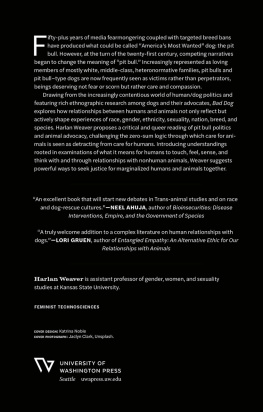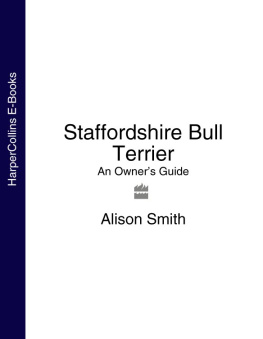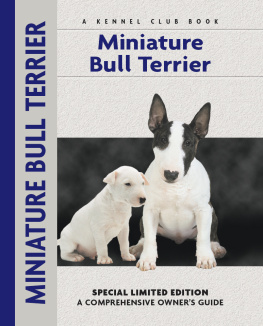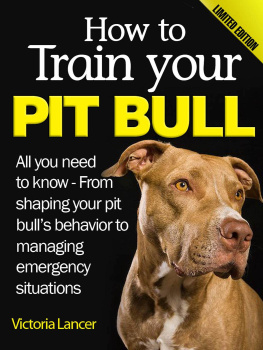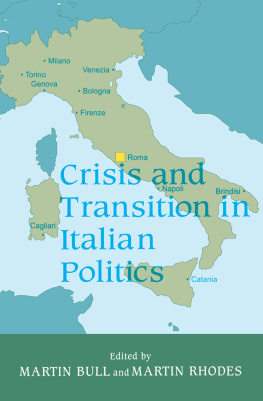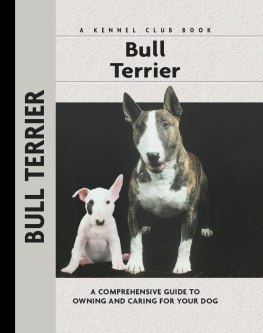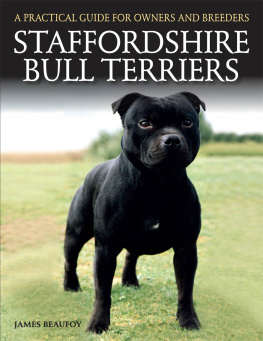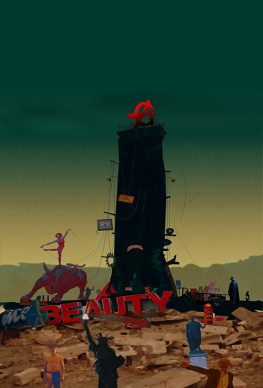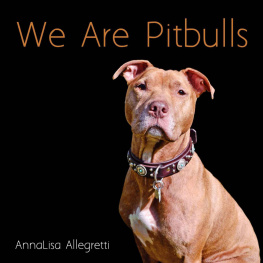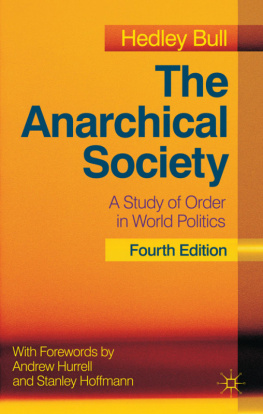Feminist Technosciences
Rebecca Herzig and Banu Subramaniam, Series Editors
Bad
Dog
PIT BULL POLITICS AND
MULTISPECIES JUSTICE
HARLAN WEAVER
UNIVERSITY OF WASHINGTON PRESS
Seattle
Bad Dog was made possible in part by the University of Washington
Press Authors Fund.
Copyright 2021 by the University of Washington Press
Interior design by Thomas Eykemans
Composed in Chaparral, typeface designed by Carol Twombly
Cover design by Katrina Noble
Cover illustration: Jaclyn Clark, Unsplash.
25 24 23 22 215 4 3 2 1
Printed and bound in the United States of America
All rights reserved. No part of this publication may be reproduced or transmitted in any form or by any means, electronic or mechanical, including photocopy, recording, or any information storage or retrieval system, without permission in writing from the publisher.
UNIVERSITY OF WASHINGTON PRESS
uwapress.uw.edu
LIBRARY OF CONGRESS CATALOGING-IN-PUBLICATION DATA
Names: Weaver, Harlan, author.
Title: Bad dog : pit bull politics and multispecies justice/Harlan Weaver.
Description: Seattle : University of Washington Press, [2021] | Series: Feminist technosciences | Includes index.
Identifiers: LCCN 2020020395 (print) | LCCN 2020020396 (ebook) |
ISBN 9780295748016 (hardcover) | ISBN 9780295748023 (paperback) |
ISBN 9780295748030 (ebook)
Subjects: LCSH: Pit bull terriersSocial aspects. | Designer dogs. |
Intersectionality (Sociology)
Classification: LCC SF429.P58 W43 2020 (print) | LCC SF429.P58 (ebook) |
DDC 636.755/9dc23
LC record available at https://lccn.loc.gov/2020020395
LC ebook record available at https://lccn.loc.gov/2020020396
The paper used in this publication is acid free and meets the minimum requirements of American National Standard for Information SciencesPermanence of Paper for Printed Library Materials, ANSI z39.481984.
For Charles Weaver, 19402012
Contents
Gimme Shelter: Saviorist Storying, Animal Rescue,
and Interspecies Intersectionality
Acknowledgments
This book owes its existence to an extended network, human and nonhuman, without whom this thinking, much less this writing, would not have been possible. First and foremost, I want to thank my incredible interlocutors, whose ideas shape all aspects of this book. I am also deeply grateful for the continued mentorship of Donna Haraway, whose encouragement and continued investment in shared thinking and conversations have nourished not just this book but my life. I am also deeply indebted to Carla Freccero and Karen Barad for their continued mentorship, which has extended well beyond my PhD. This book was also made possible by the mentorship and supportive thinking-with of an amazing group of folks working in and near animal studies across a range of spaces, including but not limited to Susan McHugh, Myra Hird, Brigitte Fielder, Clement Loo, Margo DeMello, Ken Shapiro, Alexandra Horowitz, Robert Jones, Sarah Hann, Gunnar Eggertsson, Eliza Ruiz Izaguirre, Juno Parreas, Mel Chen, Katharine Mershon, Elizabeth Selena Zinda, Dana Luciano, Banu Subramaniam, Angie Willey, Neel Ahuja, Eduardo Kohn, Michael Lundblad, Ann-Sofie Lngren, Tora Holmberg, Jacob Bull, Ane Gabrielsen, Jami Weinstein, Eliza Steinbock, David Redmalm, Colin Dayan, Claire Jean Kim, Kimberly Tallbear, Sandra Koelle, Mara Miele, Daniel Solomon, Cleo Woelfle-Erskine, Donald Cleary, July Cole, Logan OLaughlin, Tyler Wall, Katja Guenther, Deboleena Roy, KT Thompson, Natasha Myers, Jacob Goodman, Gabriel Rosenberg, Alice Bendinelli, Ashton Wesner, Amelia Hicks, and Astrid Schrader; I hope all of you see threads of our conversations in this writing!
Additional colleagues with whom I have shared academic and, often, queer affiliations have also sustained me in myriad ways in the process of writing this book. For their early mentorship of my undergraduate work in feminist Science and Technology Studies at Wesleyan University, I am deeply grateful to Joe Rouse, Jennifer Tucker, Christina Crosby, and Natasha Korda. For their mentorship, colleagueship, and comradeship, I owe an enormous debt to many folks with whom I connected through UC Santa Cruz, including but not limited to Eva Hayward, Gerwin Gallob, Kami Chisholm, Rebecca Herzig, Karen DeVries, Lucian OConnor, Adam Hefty, Lisette Tatiana Olivares, Lindsay Kelley, Natalie Loveless, Trevor Sangrey, Johanna Rothe, Annika Walke, Roya Rastegar, Kalindi Vora, Jenny Reardon, Warren Sack, Nancy Chen, Anne Spalliero, Melanie Lee Godinho, Sheila Peuse, Noah Tamarkin, Sarah Smith-Silverman, Jacob Metcalf, Jessica OReilly, Lulu Meza, Scout Calvert, Sara Orning, Ruth Mller, Martha Kenney, Alexis Shotwell, Barbara Epstein, Neferti Tadiar, Jenny Reardon, Irene Gustafson, Mara Puig de la Bellacasa, Sarah Bracke, Joe Dumit, Neda Atanasoski, and Ulrika Dahl. I continue to be profoundly grateful for the connections I made during postdoctoral work at UC Berkeley, and I want to extend my gratitude first and foremost to Cori Hayden, without whose mentorship this book would not have happened; for their conversations and thinking-with, I am deeply grateful to Veronica Sanz, Charis Thompson, Nicholas DAvella, Doris Liebetseder, Nolwenn Bller, Marissa Mika, Samuel Weiss-Evans, and Veronica Sanz. Patricio Boyer, Trish Tillburg, and Mel Gonzlez at Davidson College continue to be sources of support and inspiration, and I owe special thanks to Katie Horowitz, the zucchini to my fennel. Similarly, I am deeply grateful to the amazing people and organizations at Kansas State University who have helped me thrive, including Kathleen Antonioli, Lisa Tatonetti, Michele Janette, Christie Launius, Susan Rensing, Angela Hubler, Valerie Padilla-Carroll, Kimberly Garver, Amber Neely, Joyce Wu, Jess Falcone, Heather McCrae, Mariya Vaughan, Tanya Gonzlez, Kimberly Garver, Kimathi Choma, Bryan Samuel, Brandon Haddock, Clara Kientz, Marion Schweitzer, the Gender Women and Sexuality Studies Departments intellectual circle, the K-State LGBTQ* FSA, and K-State Affinity Group Leadership. Special thanks go to my K-State colleague-twin, Rachel Levitt, whose friendship and sheer brilliance have nourished me in more ways than I can count. Finally, friends and colleagues localized through what might be more aptly termed trans* affiliations have also been critical to my work in this book, and I am so deeply thankful to Susan Stryker, Laura Horak, Cel Keegan, and Eliza Steinbock in this regard.
I am also deeply grateful for the opportunities I have had to share the thinking from this book through invited talks. I owe thanks to the University of Chicagos Animal Studies working group, and particularly to Katharine Mershon and Bill Hutchison, in this regard. Montana State University also provided me a wonderful opportunity to develop some interventions key to this book, and I am particularly grateful to Karen DeVries, Sara Rushing, and Kristen Intemann. The University of Kansass Hall Center for the Humanities gave me invaluable feedback on this writing, and I am beholden to Katie Batza, Stacey Vanderhurst, Brian Donovan, Akiko Takeyama, An Sasala, and Kara Kendall-Morwick in particular. Finally, I am indebted to the wonderful folks at UC Davis for their feedback on this thinking, particularly Wendy Ho and Kathleen Fredrickson, in conjunction with Rana Jaleel.
While there are only two of them, the images in this book have been central to my writing and thinking. In particular, I am profoundly grateful to Lili Chin, whose illustrations have been formative to my own understandings of dogs for many years, and who generously allowed me to use one of my favorites of her works,

